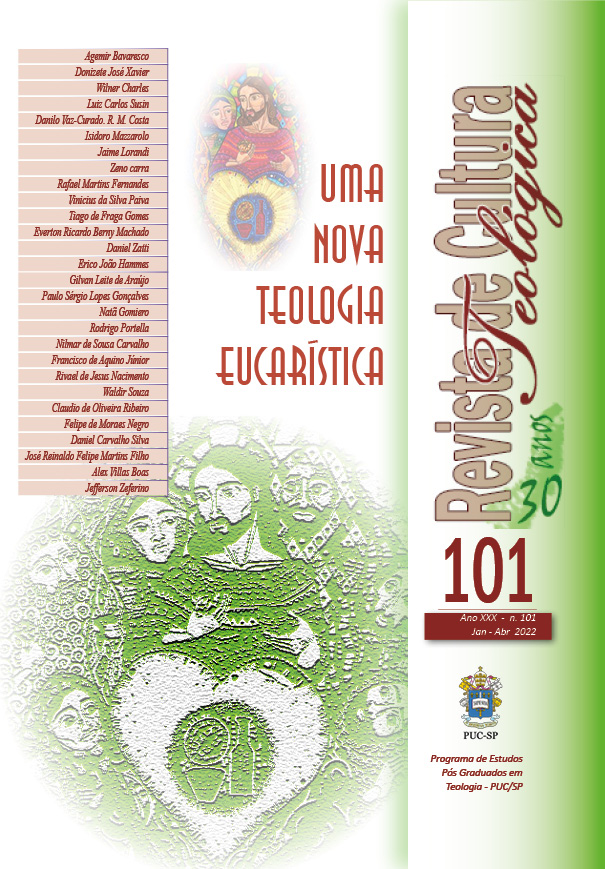A religião cristã em perspectiva pós-moderna
diálogo entre Gianni Vattimo e René Girard
DOI:
https://doi.org/10.23925/rct.i101.55523Keywords:
religion, non-religious Christianity, sacrifice, charityAbstract
ABSTRACT
The aim of this article is to theoretically analyze the Christian religion in a post-modern perspective, present in the dialogue between the thinker Gianni Vattimo and René Girard. Our objective is justified, the post-modern category coined from the considerations of Gianni Vattimo, in which “pensiero debole” and non-religious Christianity outline a new epistemological scenario. Post-modernity, then, is not configured as an end to the Christian faith, but it is the self-realization of this religion. Vattimo's thought is welcomed by the Frenchman René Girard, who, based on his mimetic theory and study of the meaning of sacrifice in the great human cultures, develops new considerations for the Christian religion, highlighting its anthropological originality. Nevertheless, Christian charity, for both authors, supersedes any institutional interpretation of faith and is the core element of the revelatory process of God in Jesus Christ. Therefore, the question remains: it is enough for Christianity to be a religion of charity to configure itself as a true religion. To answer this question and aiming to achieve the proposed objective, the dialogue between these thinkers will be taken as material object, present in the work Christianity and Relativism, the work Believing what is believed by Gianni Vattimo, the work O Scapegoat by René Girard and commentators on the subject.
References
BALEEIRO, Cleber A. S. Baleeiro. Verwindung: a idéia de “superação” no pensamento de Vattimo. Revista Eletrônica Correlatio n. 18 - Dezembro de 2010. Disponível em: < https://www.metodista.br/revistas/revistas-metodista/index.php/COR/article/download/2400/2382 > Acesso em: 05 de Maio 2021.
GIRARD, René. O Bode expiatório. São Paulo: Paulus, 2004.
GIRARD, René. O Sacrifício. São Paulo: Realizações, 2011.
GODOY, Edvilson de. Enfoques do pensamento de René Girard. In: Revista de Cultura Teológica. v. 20. n. 80 - OUT/DEZ 2012. Disponível em: < https://revistas.pucsp.br/index.php/culturateo/article/view/14408>. Acesso em 06 de Jun. 2021.
GONÇALVES, Paulo Sérgio Lopes. Religião e ética no cristianismo não religioso: Uma abordagem a partir de Gianni Vattimo. in: Rev. Pistis Prax., Teol. Pastor., Curitiba, v. 10, n. 2, 244-268, maio/ago. 2018. Disponível em: < https://periodicos.pucpr.br/index.php/pistispraxis/article/view/23854>. Acesso em 23 de Out. 2020
GONÇALVES, Paulo Sérgio Lopes. Fé cristã e ciência na Era Contemporânea. In: Reflexão, Campinas, 40(2):193-209, jul./dez., 2015. Disponível em: < https://seer.sis.puc-campinas.edu.br/seer/index.php/reflexao/article/view/3297>. Acesso em 03 de Maio de 2021.
VATTIMO, Gianni. Crer que se crê. Petrópolis, Rio de Janeiro: Vozes, 2018.
VATTIMO, Gianni. O fim da modernidade. Niilismo e hermenêutica na cultura pós-moderna. São Paulo: Martins Fontes, 2002.
VATTIMO, Gianni; GIRARD, René. Cristianismo e Relativismo: Verdade ou fé frágil? Aparecida, Sp: Editora Santuário, 2010
PEREZ, Léa Freitas. Acreditar em acreditar com Gianni Vattimo. In: Numen: revista de estudos e pesquisa da religião, Juiz de Fora, v. 15, n. 1, p. 187-215. Disponível em: < https://periodicos.ufjf.br/index.php/numen/article/view/21842/11891>. Acesso em: 02 de fev. 2021.
ROTTERDAN, Sandson; SENRA, Flávio. O cristianismo não religioso de Gianni Vattimo: considerações para o senso religioso contemporâneo. In: Religare, ISSN: 19826605, v.12, n.1, junho de 2015, p.96-127.
SALES, Omar Lucas Perrout Fortes de. A vocação niilista da hermenêutica filosófica de Gianni Vattimo radicada no processo da secularização cristã. In: Revista Horizonte, Belo Horizonte, v. 13, n. 39, p. 1580-1608, jul./set. 2015 – ISSN 2175-5841. Disponível em: < http://periodicos.pucminas.br/index.php/horizonte/article/view/P.2175-5841.2015v13n39p1580> . Acesso em: 05 de set. 2020.
Published
How to Cite
Issue
Section
License
Copyright (c) 2022 Revista de Cultura Teológica

This work is licensed under a Creative Commons Attribution-NonCommercial-NoDerivatives 4.0 International License.
Os autores concedem à revista todos os direitos autorais referentes aos trabalhos publicados. Os conceitos emitidos em artigos assinados são de absoluta e exclusiva responsabilidade de seus autores.

